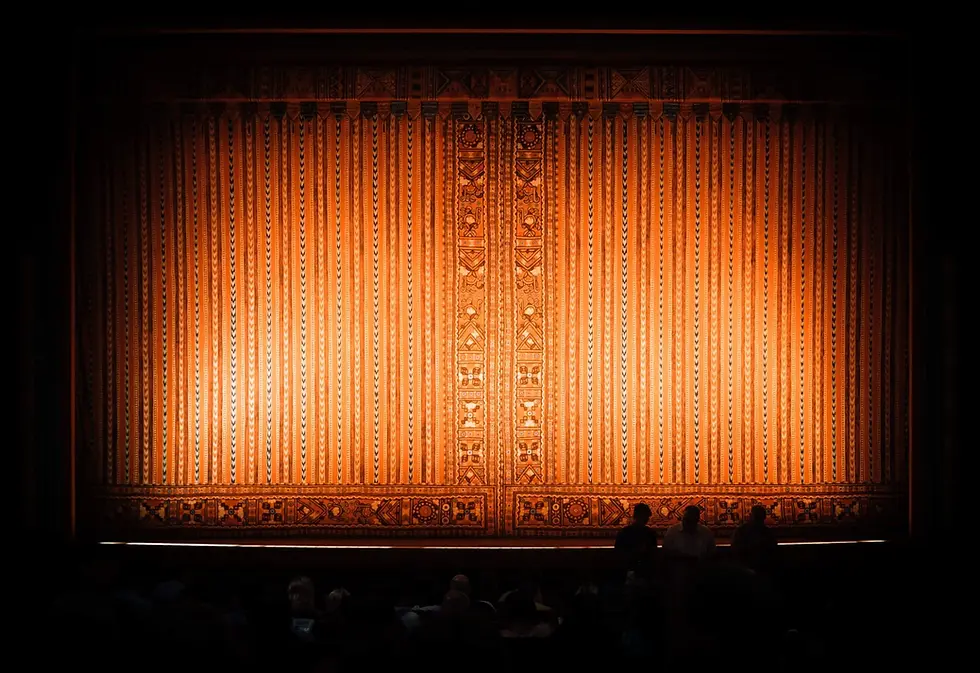Journeys of Renewal Through Hadestown
- John Bucher, PhD

- May 16, 2021
- 3 min read

The pathways that guide people to the land of myth are many. For me, it was a path called art. Growing up in a small town in East Texas, storytelling was in the very air we breathed. However, I was never content with just any story. I was always looking for something just under the surface of the narrative. I always wanted…something…something I couldn’t quite put words to in the stories I experienced. This ineffable magic always ran in the DNA of the stories I loved most. I sometimes wondered why I enjoyed stories of King Arthur’s quests as much as I enjoyed Star Wars and if one day, I would need to declare an allegiance in order to fully be accepted into one of those tribes. While I was raised in a hotbed of religious fervor, it was these other sorts of stories, this type of art, that brought me to consider the big questions, like what it meant to be fully human and alive.
Perhaps it was my religious upbringing, but I was always drawn to stories about the supernatural and other worlds, including worlds that my faith tradition had given me a framework for: heaven and hell. I suppose the land of myth was a distant homeland I was always destined to be drawn to. In Myths of Light, Joseph Campbell says that “The realms of the gods and demons—heaven, purgatory, hell – are of the substance of dreams. Myth, in this view, is the dream of the world. If we accept gods as objective realities, then they are the counterpoint of your dream – this is a very important point – dream and myth are of the same logic” (70). This mystic relationship between myth and dream always felt true to me, even before I had the language to articulate it. This might be because so many of the stories that I would later learn were mythic were ones I first experienced in the dark, as though I was asleep and the myth I was experiencing was my dream. I devoured mythic narratives in the darkness of the movie theater and in my bed at night, reading only by the illumination of a flashlight.
A couple of years ago I had another dream-like mythic experience, again in the darkness, this time in the darkness of a Broadway theater. Anaïs Mitchell’s Hadestown intertwines two mythic stories — that of the young dreamers Orpheus and Eurydice, and that of King Hades and his wife Persephone. The musical had opened to critical acclaim and received numerous awards and nominations, including a total of 14 nominations at the 73rd Tony Awards — the most for the evening — and eight wins, including Best Musical and Best Original Score. Set in a Great Depression-era inspired post-apocalyptic world and narrated by the god Hermes, Hadestown manages to accomplish the rare feat of dealing directly with well-known myths, yet still managing to communicate something fresh about the mythic state of our current world. I sat in the theater that night thinking that it had happened again: art had again transported me to that land of myth that felt like home since I was young.
Watching Orpheus, Eurydice, Hades, and Persephone come to life before my eyes on that stage caused me to once again think of Campbell’s words as I lay in bed that night. Further discussing the deities and their domains, he said, “All the heavens and gods are within you and are identical with aspects of your own consciousness on the dream level” (70). My dreams were initiated that evening with considerations of the figures, Orpheus and Persephone, that both lived inside of me. I was challenged by thoughts of the Hades and Eurydice that I knew existed within my own psyche. This sacred work carried out by myth, and in my case by the artistic expressions of myth, have reshaped who I am and remind me of who I could yet be. They have renewed me, again and again.
I’m honored to announce that the Joseph Campbell Foundation is partnering in two new endeavors with musical artist Ani DiFranco’s Righteous Babe Radio. The station will be featuring episodes from podcasts on JCF’s MythMaker Podcast Network in May – a project they are calling MythMaker May. Another forthcoming endeavor will be a recorded audio conversation between Bob Walter, President of the Joseph Campbell Foundation, Anaïs Mitchell, creator of Hadestown, Rachel Chavkin, director of Hadestown, and Ani DiFranco, owner of Righteous Babe Records and the voice of Persephone on the Hadestown album released on Righteous Babe in 2010, about the intersection of music and myth in Hadestown. Support MythMaker May on Righteous Babe Radio and keep an eye on JCF.org and follow JCF’s social media channels for more information on our future mythic endeavors.

%20BB.png)








